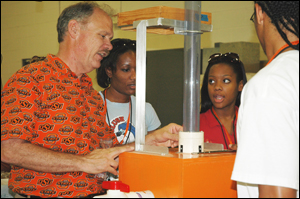State youth experience agricultural study, research at OSU, Langston
Wednesday, July 26, 2006
“It sounds hard, but it’s not. I got a degree in biochemistry, and so can you,” said Mitchell, interim head of OSU’s Department of Biochemistry and Molecular Biology. “And if you want to do it here, we’ve got lots of (scholarship) money for you.”
The 7th- through 12th-graders are chapter members of Retired Educators for Youth Agricultural Programs, a nonprofit organization created by Oklahoma teachers to help minority youth realize their potential through opportunities in agriculture. Mitchell spoke to them at the start of a workshop during the inaugural REYAP Agriculture Science and Technology Institute.

Hosted by OSU and Langston University, the July 19-21 institute introduced 43 REYAP members to agricultural degree, research and career options. Housed in OSU residential suites, the students toured facilities, interacted with faculty members and participated in hands-on workshops at both campuses.
DNA analysis was the focus of the biochemistry/molecular biology workshop, but students had to solve a puzzle less far-fetched than those dramatized on television. Given the DNA fingerprints of five different bulls and one calf, they determined the calf’s sire.
“There aren’t many opportunities to learn this at my school,” said Wynnewood High School senior Quincy Turner, 16. “I’ve learned a lot more about agriculture through this program, such as how biochemistry helps the ag industry, which is good for the food industry.”
Students also participated in workshops involving agricultural engineering and, at Langston, pathology and aquaculture. The latter two gave them a glimpse at agriculture scientists’ work to develop new antibiotics for resistant strains of food-borne bacteria and pond management in freshwater seafood production.
“We were especially pleased with the cooperation between Langston and OSU faculty,” said Dr. Ladonna McCowan, Oklahoma Cooperative Extension Service specialist in OSU’s School of Biosystems and Agricultural Engineering and REYAP institute coordinator. “Even faculty members who weren’t involved with the institute came by and asked how they could help.”
“The students were very comfortable with faculty and indicated they’d have no problem calling them to talk about majors and career options, which was a goal of the institute,” she said.
Organizers hope the institute served to emphasize the importance of science and math study as preparation for college. The students will continue to work on science projects that originated with the workshops.
“We want the students to know about non-traditional agriculture careers as well as traditional careers, but non-traditional — the agricultural engineering, genetics, biotechnology, biochemistry — is where most of the students’ interests lie,” said Rita Combs, REYAP executive director.
“They will take what they’ve learned and spend the rest of the year completing science projects that will be the basis for entries in REYAP contests here in Oklahoma. And then they will compete nationally at the MANNRS (Minorities in Agriculture, Natural Resources and Related Sciences) annual conference.”
The two-and-a-half-day agenda was not limited to science and included personal and professional development activities and cultural experiences. The students were feted at a professional, formal banquet attended by REYAP leadership and OSU and Langston administrators, including Dr. Bob Whitson, vice president, dean and director of DASNR, and Dr. Marvin Burns, dean of Langston’s School of Agriculture, Applied Sciences and Research.
“The institute was very successful, and 100% of the students said they’d return,” McCowan said. “It was an exciting experience for them, especially the program that the OSU Latin Dance Club did for us.
“The enthusiasm of our faculty was outstanding. We’ve already met and decided to do the institute again, except next year. We hope to extend it to five days.”
REYAP was founded in 1994 in Bristow, Oklahoma, by the late Sam Combs Jr., W.G. Parker, James R. Johnson, A.W. Hampton and M.E. Gamble, retired vocational agriculture teachers who realized there were no longer any African-American vocational agriculture teachers in Oklahoma. Its mission is to help African American, Native American and Hispanic youth experience career-building opportunities and learn important life skills through agriculture-related activities.
